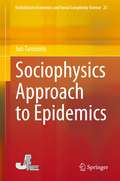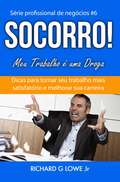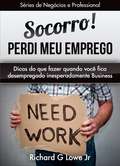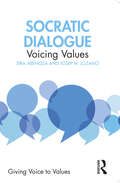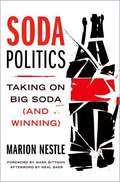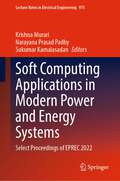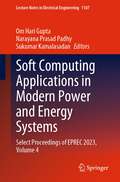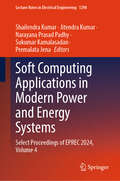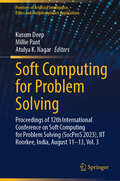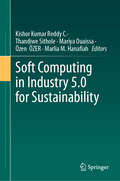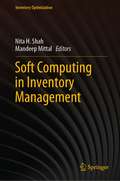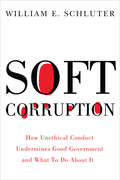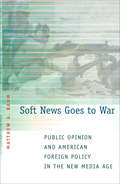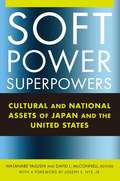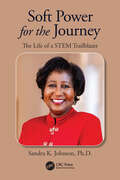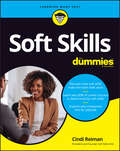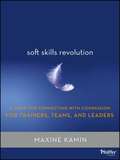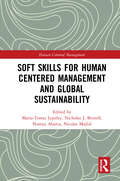- Table View
- List View
Sociophysics
by Serge GalamDo humans behave much like atoms? Sociophysics, which uses tools and concepts from the physics of disordered matter to describe some aspects of social and political behavior, answers in the affirmative. But advocating the use of models from the physical sciences to understand human behavior could be perceived as tantamount to dismissing the existence of human free will and also enabling those seeking manipulative skills . This thought-provoking book argues it is just the contrary. Indeed, future developments and evaluation will either show sociophysics to be inadequate, thus supporting the hypothesis that people can primarily be considered to be free agents, or valid, thus opening the path to a radically different vision of society and personal responsibility. This book attempts to explain why and how humans behave much like atoms, at least in some aspects of their collective lives, and then proposes how this knowledge can serve as a unique key to a dramatic leap forwards in achieving more social freedom in the real world. At heart, sociophysics and this book are about better comprehending the richness and potential of our social interaction, and so distancing ourselves from inanimate atoms.
Sociophysics Approach to Epidemics (Evolutionary Economics and Social Complexity Science #23)
by Jun TanimotoThis book presents the fundamentals of evolutionary game theory and applies them to the analysis of epidemics, which is of paramount importance in the aftermath of the worldwide COVID-19 pandemic. The primary objective of this monograph is to deliver a powerful tool to model and analyze the spread of an infectious disease during a pandemic as well as the human decision dynamics. The book employs a variant of the “vaccination game,” in which a mathematical epidemiological model dovetails with evolutionary game theory. From a social physics standpoint, this book introduces an extended concept of the vaccination game starting from the fundamental issues and touching on the newest practical applications.The book first outlines the fundamental basis of evolutionary game theory, in which a two-player and two-strategy game, the so-called 2 × 2 game, and a multi-player game are concisely introduced, and the important issue of how social dilemmas are quantified is highlighted. Subsequently, the book discusses various recent applications of the extended concept of the vaccination game so as to quantitatively evaluate provisions other than vaccination, including practical intermediate protective measures such as mask-wearing, efficiency of quarantine compared with that of isolation policies for suppressing epidemics, efficiency of preemptive versus late vaccination, and optimal subsidy policies for vaccination.
Socorro! Meu Trabalho é uma Droga: Dicas de como Fazer seu Trabalho ser mais Satisfatório e Melhorar sua Carreira
by Richard G Lowe JrVocê não tem que ser vítima de um trabalho que é uma droga. Você pode assumir o controle e mudar a situação. Lidar com um trabalho que está te deixando doente, te fazendo perder dinheiro e promoções ou fazendo com que você fique chateado e irritado sem vender sua alma para a corporação. Seu trabalho está deixando você fisicamente doente? Você tem medo de levantar todos os dias porque você tem que ir ao odiado escritório? Você só se sente vivo nos finais de semana porque não precisa ir trabalhar? Seu chefe é um idiota que está constantemente te assediando, negando aumentos e te deixando infeliz? Não seria melhor estar ansioso para ir trabalhar todos os dias? Você gostaria de um trabalho desafiador, onde você recebe um salário justo, é tratado com humanidade e compaixão e onde recebe os recursos, treinamento e ajuda que precisa para ter sucesso? Eu trabalhei em empregos insatisfatórios para empregadores que não se importavam e não recompensavam um serviço bom e competente. Eu permaneci fiel, fazendo cegamente o que me foi dito, obrigado a ficar de plantão 24 horas por dia, 7 dias por semana, trabalhar sem treinamento e recursos adequados, e passar meses sem um elogio ou um agradecimento. Eu sobrevivi através de pura força de vontade, determinação e uma crença em mim e minhas habilidades. Mas existe uma maneira melhor do que aguentar o abuso e ser vítima de má gestão, apoio insuficiente, exigências não razoáveis e até ilegais. Você pode assumir o controle de sua situação, contanto que esteja disposto a se impor, exigir seus direitos e ser tratado de forma justa, e estar disposto a se mudar se não puder corrigir a situação. * Aprenda a se comunicar sem medo * Lide com o chefe maluco * Lide com assédio sem piedade * Pare de permitir que se aproveitem de você e te usem * Consiga aquela promoção ou aumento que você merece<br
Socorro! O Meu Chefe é Maluco!
by Richard G Lowe Jr Andreia AfonsoSobrevivendo ao chefe Whacko Melhore sua vida profissional. Aumente sua renda. Seja mais produtivo e satisfeito no trabalho. Sinta-se mais feliz e mais em controle O chefe está te deixando louco? Você está sofrendo de assédio? É o seu local de trabalho desagradável e tornando-o fisicamente ou mentalmente doente? Alguma vez você já sentiu como você quer Whack seu chefe por causa de assédio? Eu estive onde você está hoje. Os Whackos Na minha vida, eu tive todos os tipos de gerentes, de um chefe que foi declarado insano para o micromanager compulsivo e, pior de tudo, o gerente para a aposentadoria que não queria aprovar ou fazer qualquer coisa que possa balançar o barco . Eu me sentia atacada, desprezada, desvalorizada e oprimida, às vezes tudo ao mesmo tempo. Essas situações afetaram minha saúde e bem-estar e causaram um sentimento de desamparo e depressão que nada parecia consertar. A vida parecia ser nada, mas fracasso devido às constantes invalidações e negatividade. Seu chefe está te deixando louco? Seu chefe está te deixando louco ou assediando você? É ele ou ela fazendo o seu miserável, negando-lhe levanta e promoções, ou micromanaging cada movimento seu? Você está feliz com sua situação de trabalho? Você entende que não vai melhorar a menos que você faça algo sobre isso? Você prefere olhar para a frente para ir trabalhar todos os dias? Você não gostaria de ser respeitado, ganhar mais dinheiro e ir para casa sentindo-se satisfeito em fazer um trabalho bem feito? Faça alguma coisa sobre isso Bem, eu percebi que eu poderia fazer algo sobre o chefe whacko. Havia muitas opções, de uma conversa simples todo o caminho para encontrar um novo emprego. O que eu percebi é que leva dois para ser uma vítima - o vitimizador (o chefe whacko) ea vítima. Eu decidi quebrar aquela dança louca. Entenda que você pode fazer algo para corrigir a situação
Socorro! Perdi meu emprego
by Richard G Lowe Jr Rodrigo dos Santos LaraDicas do que fazer quando você fica desempregado inesperadamente - repentinamente ter que deixar o emprego pode ser um momento difícil e deprimente na sua vida. Aprenda algumas das coisas que você precisa considerar e lidar caso isso aconteça.
Socrates Comes To Wall Street
by Thomas I. WhiteFor courses in Business Ethics A fresh approach to the assumptions that underlie business practices Two recent events — the 2008 economic meltdown and the ongoing concentration of the nation’s wealth in the hands of a very small percentage of the population — have led many people to question a number of basic assumptions about business, corporations, and the workings of contemporary free-market capitalism in a global economy. Written as a dialogue between Socrates and a hypothetical contemporary CEO, Socrates Comes to Wall Street leads students to think critically about perspectives and practices that are taken as “givens” in most American business schools and corporations. Employing this original and provocative approach, author Thomas White seeks to encourage the next generation of business leaders to be more astute about the implications of their actions, and to act more prudently and more fairly than we have seen in the recent past.
Socratic Dialogue: Voicing Values (Giving Voice to Values)
by Josep M. Lozano Sira AbenozaGiving Voice to Values is a very important tool that has helped many professionals better align what they do with what they value and believe. This book introduces the methodology of Socratic Dialogue as a complementary set of tools for creating spaces of joint reflection in which one can gain clarity about one’s values and gain the confidence to voice them effectively. Socrates’ main concern was to progressively reach a higher alignment between ideas and actions: that is, to achieve a harmony between what we think, what we say and what we do. The first step to giving voice to our values involves introspection and dialogue with others – which is how we can become aware of what we really think and value. An examined life, Socrates reminds us, is a fulfilled one. Based on the authors' more than ten years’ experience teaching Socratic Dialogue to business and law students, executives and professionals, faculty, incarcerated people and other vulnerable groups, the book provides teachers and practitioners with a roadmap to conceive, design and conduct Socratic Dialogue courses and sessions. It provides context for the method and its adaptation to the challenges of the 21st century. The book also offers guidance on how to structure a Socratic Dialogue classroom, as well as a series of tried-and-true activities and exercises, practical recommendations and testimonies of the transformative impact that dialogue courses have had on participants. The book is of prime interest to professors and educators of business ethics, as well as professional consultants working to help organizations become more responsible and introduce ethical reasoning in their decisions. It also serves as a valuable resource for social educators and practitioners in prisons and rehabilitation units, as well as teachers in primary and secondary education.
Socratic Selling: How to Ask the Questions That Get the Sale
by Kevin Daley Emmett WolfeThis is the decade of the customer. You cannot learn too much about the customer. By their own admission, most salespeople talk too much. Too few "socratically" help customers draw the logical conclusion to buy what is proposed to them. The Socratic approach respects the power of the customer. The customer has the need, the power, and the decision-making authority. Socratic Selling shows the reader how to access that power, to cooperate with it, and to induce it to flow toward the salesperson. Socratic Selling shows salespeople how to build a relationship with the customer and close the sale more surely. The approach uses the Socratic Method: "A method of teaching or discussion, as used by Socrates, in which one asks a series of easily answered questions which inevitably lead the answerer to a logical conclusion." (Webster's Unabridged) You will discover in concise, easy-to-follow chapters how to: - Open a sales dialogue dynamically, so the salesperson and customer go right to the heart of the matter. - Guide the dialogue through a discovery of needs and needed decisions. - Uncover the motivators that move sales to more predictable closure. - Negotiate objections, handle challenging questions, and close effectively. - Move to the next step in the closing process so that every sales meeting has definition.
Soda Politics: Taking on Big Soda (and Winning)
by Marion Nestle Mark Bittman Neal BaerSodas are astonishing products. Little more than flavored sugar-water, these drinks cost practically nothing to produce or buy, yet have turned their makers - principally Coca-Cola and PepsiCo - into a multibillion-dollar industry with global recognition, distribution, and political power. Billed as "refreshing," "tasty," "crisp," and "the real thing," sodas also happen to be so well established to contribute to poor dental hygiene, higher calorie intake, obesity, and type-2 diabetes that the first line of defense against any of these conditions is to simply stop drinking them. Habitually drinking large volumes of soda not only harms individual health, but also burdens societies with runaway healthcare costs. So how did products containing absurdly inexpensive ingredients become multibillion dollar industries and international brand icons, while also having a devastating impact on public health? In Soda Politics, Dr. Marion Nestle answers this question by detailing all of the ways that the soft drink industry works overtime to make drinking soda as common and accepted as drinking water, for adults and children. Dr. Nestle, a renowned food and nutrition policy expert and public health advocate, shows how sodas are principally miracles of advertising; Coca-Cola and PepsiCo spend billions of dollars each year to promote their sale to children, minorities, and low-income populations, in developing as well as industrialized nations. And once they have stimulated that demand, they leave no stone unturned to protect profits. That includes lobbying to prevent any measures that would discourage soda sales, strategically donating money to health organizations and researchers who can make the science about sodas appear confusing, and engaging in Corporate Social Responsibility(CSR) activities to create goodwill and silence critics. Soda Politics follows the money trail wherever it leads, revealing how hard Big Soda works to sell as much of their products as possible to an increasingly obese world. But Soda Politics does more than just diagnose a problem - it encourages readers to help find solutions. From Berkeley to Mexico City and beyond, advocates are successfully countering the relentless marketing, promotion, and political protection of sugary drinks. And their actions are having an impact - for all of the hardball and softball tactics the soft drink industry employs to maintain the status quo, soda consumption has been flat or falling for years. Health advocacy campaigns are now the single greatest threat to soda companies' profits. Soda Politics provides readers with the tools they need to keep up pressure on Big Soda in order to build healthier and more sustainable food systems.
Sof-Optics, Inc. (A)
by W. Earl Sasser Jr. David C. Rikert Ramchandran JaikumarThe marketing director of a fast-growing firm must make some decisions about the customer service department. The volume in the department has been rising steadily, eye doctors are waiting longer for orders to be filled, and morale in the department is slipping. With pressure on the firm to make a profit, the marketing director must carefully justify any request for additional people or equipment.
Soft Computing Applications in Modern Power and Energy Systems: Select Proceedings of EPREC 2022 (Lecture Notes in Electrical Engineering #975)
by Narayana Prasad Padhy Krishna Murari Sukumar KamalasadanThis book provides rigorous discussions, case studies, and recent developments in soft computing and its application in power systems enabled with power electronics-based equipment, biomedical engineering, and image processing. The readers would be benefitted from enhancing their knowledge and skills in the domain areas. This book also helps the readers in developing new and innovative ideas.
Soft Computing Applications in Modern Power and Energy Systems: Select Proceedings of EPREC 2023, Volume 4 (Lecture Notes in Electrical Engineering #1107)
by Om Hari Gupta Narayana Prasad Padhy Sukumar KamalasadanThis book includes select proceedings of EPREC 2023. It provides rigorous discussions, case studies, and recent developments in the areas of soft computing and its applications in power systems enabled with power electronics-based equipment, energy systems, and the energy community. The other topics to be covered are optimal planning, analysis, operation, and control related to modern power and energy systems, and applications of various soft computing methodologies. The readers find this book useful for enhancing their knowledge and skills in the domain areas.
Soft Computing Applications in Modern Power and Energy Systems: Select Proceedings of EPREC 2024, Volume 4 (Lecture Notes in Electrical Engineering #1298)
by Jitendra Kumar Shailendra Kumar Premalata Jena Narayana Prasad Padhy Sukumar KamalasadanThis book entitled “Soft Computing Applications in Modern Power and Energy Systems” aims to offer in-depth discussions, case studies, and the latest advancements in the realm of soft computing as it pertains to power systems incorporating power electronics-based equipment, energy systems, and energy communities. It also explores topics such as optimal planning, analysis, operation, and control in the context of modern power and energy systems, along with the applications of various soft computing techniques. Readers will find valuable opportunities to enrich their understanding and expertise in these specialized domains. Furthermore, this book has the potential to inspire readers to generate novel and innovative ideas in the field.
Soft Computing for Problem Solving: Proceedings of 12th International Conference on Soft Computing for Problem Solving (SocProS 2023), IIT Roorkee, India, August 11–13, Vol. 3 (Frontiers of Artificial Intelligence, Ethics and Multidisciplinary Applications)
by Millie Pant Kusum Deep Atulya K. NagarThis proceedings volume presents 41 high-quality research contributions at the forefront of soft computing theory and applications and real-world impact. The third volume from this conference, its chapters reflect the current trajectory of soft computing research, covering advances in machine learning, neural networks, fuzzy systems, nature-inspired algorithms, and big data analytics. Applications discussed range across critical domains such as healthcare, education, legal systems, cybersecurity, environmental monitoring, and industrial automation. Noteworthy contributions include studies on smart assistive devices for Alzheimer&’s patients, intelligent classification of recycled materials, and AI-based criminal face detection systems. On the theoretical side, the volume includes novel algorithmic developments such as the Shuffled Flamingo Search Algorithm and structural insights into swarm-based optimisation. The volume illustrates how soft computing continues to address complex real-world problems through adaptive, scalable, and human-centric approaches. It also captures the spirit of interdisciplinary engagement, with contributions from early-career researchers alongside seasoned academics, enriching the community&’s collaborative potential. This book will be of interest to researchers, engineers, practitioners, and postgraduate students working in artificial intelligence, optimisation, and computational intelligence, particularly those interested in the translational impact of soft computing across diverse sectors.
Soft Computing in Industry 5.0 for Sustainability
by Mariya Ouaissa Kishor Kumar Reddy C. Thandiwe Sithole Özen Özer Marlia M. HanafiahSoft computing and Industry 5.0 are two distinct concepts that, when combined, can have a significant impact on sustainability initiatives within various industries. Soft computing is a subfield of artificial intelligence (AI) that aims to address problems characterized by uncertainty, imprecision, and partial truth. It encompasses various computational techniques, such as fuzzy logic, neural networks, genetic algorithms, and machine learning, which enable machines to deal with complex and uncertain data in a more human-like manner. Soft computing techniques are particularly valuable in sustainability efforts because they can handle non-linear relationships and uncertain data that often arise in environmental and social contexts. For example, they can be used to optimize energy consumption, waste management, and resource allocation in industries by considering various factors and trade-offs. The book highlights the latest innovations in intelligent systems in classical machine learning, deep learning, Internet of Things (IoT), Industrial Internet of Things (IIoT), blockchain, knowledge representation, knowledge management, big data, and natural language processing. (NLP). The book contains many contemporary articles from both scientists and practitioners working in many fields where soft computing, intelligent systems and the IIoT can break new ground. Intelligent systems and the Internet of Things are now essential technologies in almost every field. From agriculture to industry to healthcare, the scope of smart systems and IIoT is as wide as the horizon. Nowadays, these technologies are extensively used in developed countries, but they are still at an early stage in emerging countries. The primary market of this book is senior undergraduate students, post graduate students, practitioners, researchers, academicians, industrialists, and professionals working in areas of core computer science, electrical engineering, mechanical engineering, environmental engineering and agricultural engineering. The secondary audience of this book is individuals working in the areas of manufacturing, agriculture, remote sensing, environmental engineering, health care, smart cities, smart farming, remote sensing, supply chain management and hydrology.
Soft Computing in Inventory Management (Inventory Optimization)
by Nita H. Shah Mandeep MittalThis book presents a collection of mathematical models that deals with the real scenario in the industries. The primary objective of this book is to explore various effective methods for inventory control and management using soft computing techniques. Inventory control and management is a very tedious task faced by all the organizations in any sector of the economy. It makes decisions for policies, activities, and procedures in order to make sure that the right amount of each item is held in stock at any time. Many industries suffer from indiscipline while ordering and production mismatch. It is essential to provide best ordering policy to control such kind of mismatch in the industries. All the mathematical model solutions are provided with the help of various soft computing optimization techniques to determine optimal ordering policy. This book is beneficial for practitioners, educators, and researchers. It is also helpful for retailers/managers for improving business functions and making more accurate and realistic decisions.
Soft Corruption: How Unethical Conduct Undermines Good Government and What To Do About It
by William E. SchluterNew Jersey has long been a breeding ground for political corruption, and most of it is perfectly legal. Public officials accept favors from lobbyists, give paid positions to relatives, and rig the electoral process to favor their cronies in a system where campaign money is used to buy government results. Such unethical behavior is known as “soft corruption,” and former New Jersey legislator William E. Schluter has been fighting it for the past fifty years. In this searing personal narrative, the former state senator recounts his fight to expose and reform these acts of government misconduct. Not afraid to cite specific cases of soft corruption in New Jersey politics, he paints a vivid portrait of public servants who care more about political power and personal gain than the public good. By recounting events that he witnessed firsthand in the Garden State, he provides dramatic illustrations of ills that afflict American politics nationwide. As he identifies five main forms of soft corruption, Schluter diagnoses the state government’s ethical malaise, and offers concrete policy suggestions for how it might be cured. Not simply a dive through the muck of New Jersey politics, Soft Corruption is an important first step to reforming our nation’s political system, a book that will inspire readers to demand that our elected officials can and must do better. Visit: www.softcorruption.com (http://www.softcorruption.com)
Soft Design: Aesthetic Experience at the Intersection of Materials, Technology & Interaction
by Liliana Becerrasoft Design explores an emerging design language of emotional aesthetics that merges emotive and sensory design with ancient and new technology to create multidimensional and multisensorial experiences.soft Design integrates tangible and intangible expression of the aesthetic experience with scientific research. Chapters span the physical, hybrid and digital realms discussing varied topics such as Biodesign, thermal comfort, spatial materiality, responsive architecture, soundscapes, geometry and Biogeometry®, digital materiality, artificial intelligence and language, and the age of Meta, among many others. Case studies from design firms including IOUS Studio, Pangaia, Carbon, OPUS, FIELD.IO, Dumo Lab, to name but a few, are showcased and analyzed throughout. Chapters also include featured interviews with Lachlan Turczan, Tarun Raj, and Mario Carrillo to bring the design concepts to life. While leveraging advanced technology, soft Design is an encompassing approach to aesthetics, advocating for wellbeing, neuroinclusivity, synchrony with nature, and stronger alignment with the entire sensorial spectrum of the human experience.This will be interesting reading for a wide range of design practitioners – interior, industrial, interaction, spatial, digital, sensory, and UX designers – as well as those working in neuroaesthetics and in the converging fields of health, science and design.
Soft Law and the Global Financial System
by Chris BrummerThe global financial crisis of 2008 has given way to a proliferation of international agreements aimed at strengthening the prudential oversight and supervision of financial market participants. Yet how these rules operate is not well understood. Because international financial rules are expressed through informal, non-binding accords, scholars tend to view them as either weak treaty substitutes or by-products of national power. Rarely, if ever, are they cast as independent variables that can inform the behavior of regulators and market participants alike. This book explains how international financial law 'works' - and presents an alternative theory for understanding its purpose, operation and limitations. Drawing on a close institutional analysis of the post-crisis financial architecture, it argues that international financial law is often bolstered by a range of reputational, market and institutional mechanisms that make it more coercive than classical theories of international law predict.
Soft News Goes to War: Public Opinion and American Foreign Policy in the New Media Age
by Matthew A. BaumThe American public has consistently declared itself less concerned with foreign affairs in the post-Cold War era, even after 9/11, than at any time since World War II. How can it be, then, that public attentiveness to U.S. foreign policy crises has increased? This book represents the first systematic attempt to explain this apparent paradox. Matthew Baum argues that the answer lies in changes to television's presentation of political information. In so doing he develops a compelling "byproduct" theory of information consumption. The information revolution has fundamentally changed the way the mass media, especially television, covers foreign policy. Traditional news has been repackaged into numerous entertainment-oriented news programs and talk shows. By transforming political issues involving scandal or violence (especially attacks against America) into entertainment, the "soft news" media have actually captured more viewers who will now follow news about foreign crises, due to its entertainment value, even if they remain uninterested in foreign policy. Baum rigorously tests his theory through content analyses of traditional and soft news media coverage of various post-WWII U.S. foreign crises and statistical analyses of public opinion surveys. The results hold key implications for the future of American politics and foreign policy. For instance, watching soft news reinforces isolationism among many inattentive Americans. Scholars, political analysts, and even politicians have tended to ignore the soft news media and politically disengaged citizens. But, as this well-written book cogently demonstrates, soft news viewers represent a largely untapped reservoir of unusually persuadable voters.
Soft Power Superpowers: Cultural And National Assets Of Japan And The United States
by Yasushi Watanabe David L McConnellThe term "soft power" describes a country's ability to get what it wants by attracting rather than coercing others - by engaging hearts and minds through cultural and political values and foreign policies that other countries see as legitimate and conducive to their own interests.This book analyzes the soft power assets of the United States and Japan, and how they contributed to one of the most successful, if unlikely, bilateral relationships of the twentieth century. Sponsored by the U.S. Social Science Research Council and the Japan Foundation's Center for Global Partnership, the book brings together anthropologists, political scientists, historians, economists, diplomats, and others to explore the multiple axes of soft power that operate in the U.S.-Japanese relationship, and between the United States and Japan and other regions of the world.The contributors move beyond an "either-or" concept of hard versus soft power to a more dynamic interpretation, and demonstrate the important role of non-state actors in wielding soft power. They show how public diplomacy on both sides of the Pacific - bolstered by less formal influences such as popular cultural icons, product brands, martial arts, baseball, and educational exchanges - has led to a vibrant U.S.-Japanese relationship since World War II despite formidable challenges. Emphasizing the essentially interactive nature of persuasion, the book highlights an approach to soft power that has many implications for the world today.
Soft Power for the Journey: The Life of a STEM Trailblazer
by Sandra K. JohnsonThis is a story of an African American woman working at the highest levels in STEM. Dr. Sandra K. Johnson earned a Ph.D. in electrical and computer engineering from Rice University, Houston, Texas, in May 1988, the first Black woman to do so. She then became a successful global technology leader and an IBM Chief Technology Officer (CTO). The story narrates the inextricable human dimension of dealing with various personal and familial challenges that people naturally encounter—with the highs and lows, and exhilarations and disappointments. It portrays her inner strength, persistence, dedication, boldness, quiet resilience, wisdom and strong faith, this soft power she leverages throughout her life. It is a heartwarming, compelling story designed to encourage, be aspirational and awe-inspiring, and uplift the spirits of a broad and diverse readership.From tragically losing her father at the age of two, to being raised by a single mother of four children, Sandra showed promise in math and science, and discipline and unrelenting drive at a young age. Raised in the deep South, she exhibited leadership even while in kindergarten and blazed trails in leadership while in junior high and high schools. Her early education was in segregated schools, with integration coming to her hometown as she started the 5th grade. Dr. Johnson’s innate abilities led her to a summer engineering program for high school students, then on to college and graduate school.Dr. Johnson has made innovative contributions in high performance computing – supercomputers – and other areas of computer engineering. She has dozens of technical publications, over 45 pending and issued patents, and a plethora of recognition and honors in her field. The book is a fascinating and intriguing story that conveys in captivating and relatable ways the remarkable life arc of a resilient person from an underprivileged background who persistently overcomes whatever odds and challenges are encountered in her life. It is a riveting human tale of a triumphant spirit, moving forward with soft power to celebrate achievement and handle obstacles with steel willpower, influential support, and faith.Access the authors' webpage here https://softpowerforthejourney.com/
Soft Skills For Dummies
by Cindi ReimanSoft skills make the hard skills work! Soft skills are the personal qualities that make you a great communicator, problem solver, and leader on the job—and in your personal life. Soft Skills For Dummies helps you hone in on the traits you already have—or fine tune the ones that may need some extra attention—to market yourself as a workplace leader who&’s in touch with what today&’s employers are looking for: people who can lead and inspire through interpersonal communication, cultural awareness, time management, teamwork, critical thinking, and problem solving. • Sharpen the skills you need for a successful career • Improve your ability to work with others • Become a more confident job seeker and leader • Grasp the concept of soft skills through real-world applications, inspirational stories, and industry spotlights With content based on a time-tested curriculum designed to prepare you for work and life success, this book is packed with everything you need to build your soft skills to make the strongest impact possible.
Soft Skills Revolution
by M. KaminSoft skills are the cluster of personality traits, social graces, communication, language, personal habits, friendliness, and optimism that characterize relationships with other people in the workplace. In an increasingly competitive and sometimes toxic and bulling environment, soft skills training has never been more important for organizational health. This book is designed specifically to help trainers and other organizational leaders build these important skills through a variety of methods including structured training programs as well as informal learning, mentoring and coaching.
Soft Skills for Human Centered Management and Global Sustainability (Human Centered Management)
by Maria-Teresa LepeleyThis book is part of the Human Centered Book Trilogy, the 2021 volumes of the Routledge Human Centered Management HCM Series. HCM books are pioneering transformation from the traditional humans-as-a-resource approach of the industrial past, to the humans at the center management and organizational paradigm of the 21st century. HCM is built on the talent and wellbeing of people in the workplace driving work engagement, quality standards, high performance and productivity to attain long-term organizational sustainability in the global VUCA (volatile, uncertain, complex, ambiguous) environment. This book was carefully crafted by recognized international human centered scholars from four continents. Models presented bridge persistent Soft Skills gaps in management and business and particularly between education and the workforce due to excessive testing and hard/technical skills. In contrast with hard skills, Soft Skills are transferable across jobs, industries and applicable to all dimensions of life. Soft Skills are the common language of empathy, collaboration, team building, resilience and agility transforming organizations. Human and social challenges cannot be solved only with hard skills. This is a "must read Soft Skills manual" for survival and success based on attributes all human beings possess but not everybody is optimizing to excel in life and work. This and its two complementary titles Human Centered Organizational Culture: Global Dimensions and Sensible Leadership: Human Centered, Insightful and Prudent are timely readings for leaders, managers, researchers, academics, practitioners, students and the general public responsible for organizations across industries and sectors pursuing quality standards, organizational transformation and sustainability.

